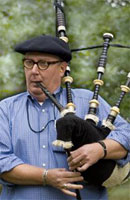|
 |
| Teachers.Net Gazette Vol.6 No.5 | May 2009 |
Subscribe for free home delivery |
|
My Mrs. Krikorian Can you hear the voice of the teacher in your past who took you in; who looked past your rap sheet and outward appearances and touched your potential with a knowing look or kind word? | ||
| by Todd R. Nelson Regular contributor to the Gazette May 1, 2008 |
||
|
For a few years now, I’ve carried this poem by Sharon Olds around in my heart. Every day at school I see examples of the fulfillment of its ancient history and prophesy of the future, if you look at it as a document that could be a record of each of our school histories and each of our present school influences. “Mrs. Krikorian,” the teacher who was an “amiable giantess with the kind eyes” begins, She saved me. When I arrived in sixth grade,  To this day (I am 52), what I remember most vividly from my own middle school years is the tone of voice of my teachers. Mrs. Tapley, Mr. Williamson, Mr. Stevens: they all had a kind of perfect pitch, a resonant tone of voice, stature, and bearing. The effect of their pedagogy and curriculum shows up to varying degrees in my adult writing, math skills, spelling, or geographical literacy. Okay, long division still confounds me, through no fault of Miss McCormack; I have a good working knowledge of the earth’s important physical features; I can spell pretty good. But what I learned from them is not necessarily the most important memory—a clue as to what I think matters in schools. It was their tone—their attitude and feeling, towards me and towards their academic subject—through which my teachers created an expectation for learning and a deep sense of aspiration. Isn’t this a kind of standards-based learning that, sadly, flies under the radar nowadays? Good teachers create a positive tone by making children feel cared for, understood, challenged, appreciated. Of course we also remember their moments of righteous indignation, mock ire, and appropriately-timed withering glances! I can still hear Mr. Stevens, my fourth grade teacher, scolding Vicki for making a sixth trip to the pencil sharpener in order to drop yet another note on Caroline’s desk, instead of paying attention to his lesson on the apostrophe. I do not remember his lesson, per se. But Mr. Stevens somehow made it personal, and that is why I can form the possessive singular. I do not know if Vicki can say the same, but surely she too can remember his tone, and the embedded value it conveyed. I knew from their tone that my teachers were powerful, or not; knowledgeable, or faking it; sincere, or going through the motions; secure, or insecure. Looking back, I know that learning occurred most spontaneously, deeply, and lastingly for me when the tone was in sync with my developmental timing—and allowances were also being made for the unique tenor of the given day. It was then that I allowed myself to be taught—or conspired with my teachers to learn, in spite of myself. I’ve come to feel that this is the fundamental transaction of good schools as well as good teachers: creating an atmosphere in which students can learn because their teachers know them intimately, have their trust, and ingeniously adapt information and skills in a way that is authentic. It would be my humble privilege to think that I have effected a few of these transactions in my experience as a teacher and administrator. I can be certain of precipitating many individual breakthroughs (“So that’s what that poem means!”); confident of training young writers in some key skills (even punctuating the possessive plural!), and hopeful that I’ve recruited, hired, and supported teachers whose gift for getting the tone right assured some future grateful memories of joyous learning. It would be my tribute to Mr. Stevens to think that I had, in fact, struck the right tone for just a few of my students and colleagues, just as he did for me. It’s my standard for considering myself a teacher.< /p> And whose Mrs. Krikorian are you? Todd R. Nelson is principal at the Adams School in Castine, Maine. | ||
|


 Todd R. Nelson has been a public and private school English teacher and administrator for 29 years, in schools in Cambridge, San Francisco, Chicago and Maine. He is principal at the Adams School in Castine, Maine, a 54 student K-8 school on the town common in a little town on the coast, where he gets to play four-square at recess, play his bagpipes, and write musicals for the all-school play.
Todd R. Nelson has been a public and private school English teacher and administrator for 29 years, in schools in Cambridge, San Francisco, Chicago and Maine. He is principal at the Adams School in Castine, Maine, a 54 student K-8 school on the town common in a little town on the coast, where he gets to play four-square at recess, play his bagpipes, and write musicals for the all-school play.